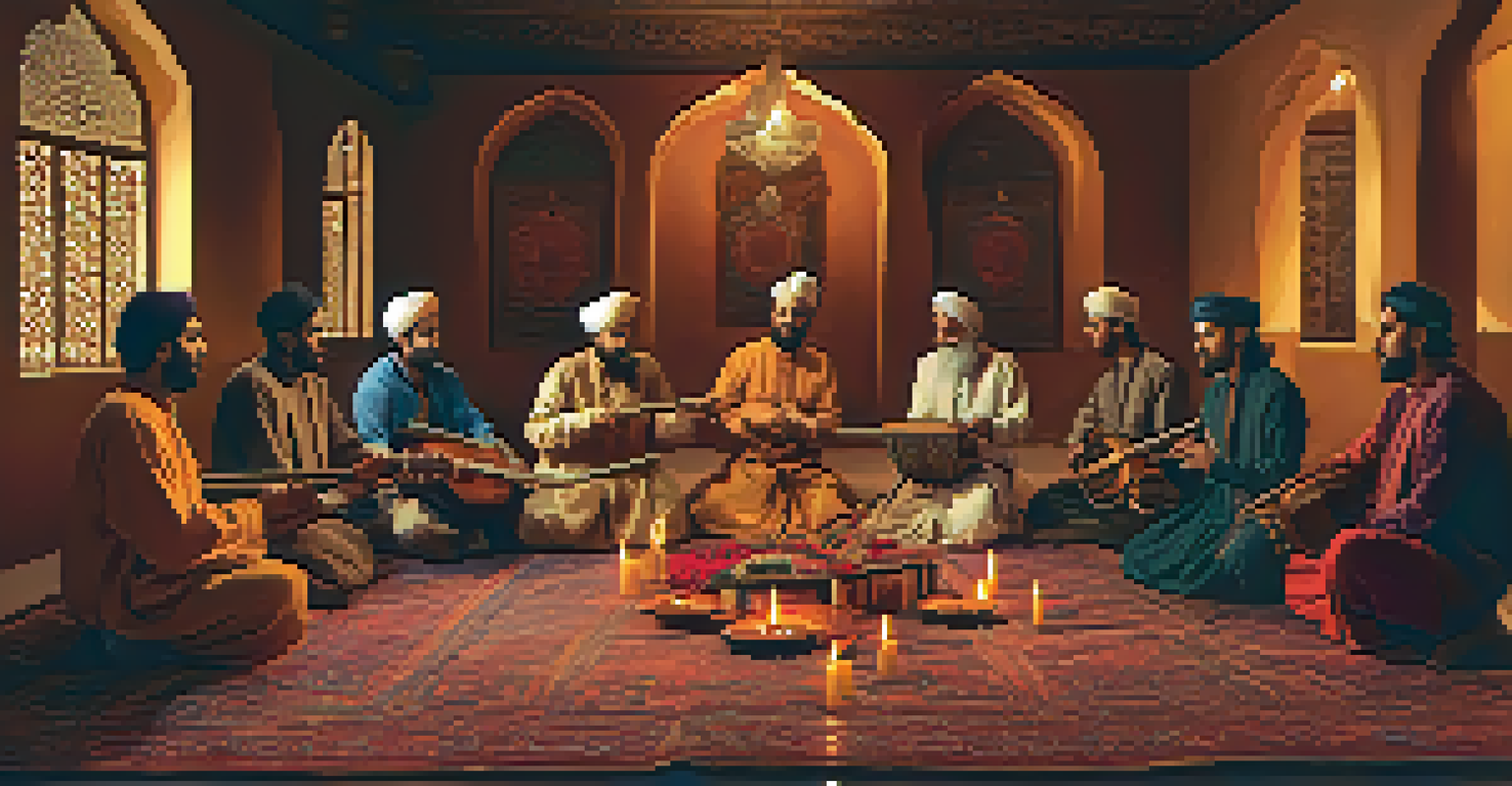The Nature of Time in Sufism: A Spiritual Inquiry

Understanding Time: A Fundamental Concept in Sufism
In Sufism, time is not merely a linear progression of past, present, and future; it is a complex and spiritual phenomenon. Sufis often view time as a divine creation, serving as a medium through which human souls experience and evolve. This understanding invites practitioners to explore time beyond its physical dimensions, considering its spiritual essence and significance in their lives.
Time is a created thing. To say 'I don't have time,' is like saying, 'I don't want to.'
For many Sufis, time is seen as a cycle rather than a straight line, emphasizing the idea of eternal recurrence. This cyclical nature of time resonates with the concept of the soul's journey, where past experiences shape present actions and future destinies. By embracing this view, Sufis can cultivate a deeper connection to their spiritual path and the divine.
Moreover, the Sufi perspective encourages mindfulness, urging individuals to live fully in the present moment. This focus on the now allows for a richer experience of life, fostering a sense of peace and contentment that transcends the worries of the past or future.
The Role of Divine Love in Shaping Time Perception
Divine love is central to Sufism, profoundly influencing how time is perceived and experienced. Sufis believe that love for the Divine can transform one's relationship with time, allowing individuals to transcend ordinary experiences. When individuals immerse themselves in divine love, they often report feeling timeless, as if they are in a state of perpetual presence.

This timelessness can lead to spiritual awakening and an expanded consciousness, where the constraints of time lose their hold. In this state, the past and future become less significant, and the soul finds solace in the eternal now. This phenomenon illustrates how love not only enriches spiritual practice but also reshapes one’s understanding of time.
Time as a Spiritual Journey
In Sufism, time is viewed as a cyclical and spiritual phenomenon, inviting practitioners to embrace the present moment for deeper growth.
Through poetry, music, and dance, Sufis express their love and devotion, creating moments that feel suspended in time. These practices become gateways to experiencing the divine, fostering a sense of unity with all creation, where the boundaries of time seem to dissolve.
Sufi Practices: Embracing Time through Rituals
Sufi practices, such as Dhikr (remembrance of God) and Sema (listening to music), play a vital role in shaping their relationship with time. These rituals encourage practitioners to enter a state of heightened awareness, where time is felt differently. Engaging in these practices allows individuals to detach from the mundane flow of time and experience a deeper spiritual reality.
The only reason for time is so that everything doesn't happen at once.
During Dhikr, for instance, participants often lose track of time as they become absorbed in the repetition of divine names. This immersion creates a profound sense of connection to the present moment, fostering an experience that transcends the confines of time. Such practices help cultivate a spiritual rhythm, aligning the heart and mind with the divine essence.
The transformative power of these rituals highlights how Sufis navigate time, turning it into a sacred journey rather than a mere passage. By engaging with these practices, individuals can cultivate a sense of presence that enriches their spiritual lives.
The Relationship Between Time and Spiritual Growth
In Sufism, time is intricately linked to spiritual growth and transformation. The journey of the soul is often viewed as a process that unfolds over time, where each moment serves as an opportunity for learning and development. This understanding encourages practitioners to embrace life's challenges as essential components of their spiritual evolution.
Sufis believe that as individuals navigate through life's experiences, they are continuously evolving toward a deeper understanding of the divine. Each moment of joy or sorrow contributes to the soul's journey, reinforcing the idea that time is a teacher guiding one toward enlightenment. This perspective fosters resilience and patience, essential qualities on the spiritual path.
Divine Love Transforms Time Perception
Sufis believe that immersing oneself in divine love allows individuals to transcend ordinary experiences and perceive time as timeless.
Ultimately, this relationship between time and growth invites Sufis to reflect on their experiences, integrating lessons learned into their spiritual practices. By viewing time as a nurturing force, individuals can approach life with gratitude and openness, allowing them to flourish on their spiritual journey.
The Concept of Fana: Transcending Time and Self
Fana, a key concept in Sufism, refers to the annihilation of the self in the presence of the Divine. This state transcends both time and ego, allowing individuals to experience unity with God. In this profound state, the individual self dissolves, and a timeless connection to the divine essence emerges.
Through the practice of Fana, Sufis often report a sense of liberation from the constraints of time. When the ego fades, the burdens of past regrets and future anxieties dissolve, leading to a state of pure awareness. This experience exemplifies how Sufism offers a pathway to transcend the limitations of ordinary existence.
By embracing Fana, practitioners can access a timeless reality where love, peace, and unity reign supreme. This transformative experience reinforces the notion that true spiritual fulfillment lies beyond the temporal, guiding individuals toward a deeper understanding of their place within the universe.
The Influence of Sufi Poetry on Perceptions of Time
Sufi poetry, rich in metaphor and spirituality, significantly influences how time is perceived within the tradition. Poets like Rumi and Hafiz explore themes of love and the divine, often portraying time as an illusion that distracts from the eternal. Their verses invite readers to reflect on the transient nature of life and the importance of seeking deeper truths.
Through evocative imagery and profound insights, Sufi poets encourage individuals to embrace the present moment. They remind us that while time may appear linear, the experience of love and connection transcends its boundaries. This perspective fosters a sense of urgency to live fully, appreciating each moment as a divine gift.
Fana: Unity Beyond Time
The concept of Fana represents the annihilation of the self in divine presence, enabling individuals to access a timeless state of awareness.
The lyrical beauty of Sufi poetry serves not just as artistic expression but as a spiritual guide, inviting readers to ponder their own relationship with time. As they engage with these verses, individuals may find themselves inspired to seek a more profound connection to the divine, recognizing the timelessness inherent in love and spiritual experience.
Conclusion: Embracing the Timeless Nature of Spiritual Existence
The exploration of time in Sufism reveals a rich tapestry of spiritual insights and practices. By understanding time as a divine creation and embracing the present moment, individuals can cultivate a deeper connection to their spiritual journey. Sufism invites us to see time not as a mere sequence of events but as a sacred opportunity for growth and transformation.
Through love, rituals, and poetic expression, Sufis navigate the complexities of time, finding meaning and purpose in each moment. This approach encourages practitioners to reflect on their experiences, embracing the lessons that time offers while remaining grounded in the present. In doing so, they can transcend the limitations of the ego and experience a profound sense of unity with the divine.

Ultimately, the Sufi perspective on time invites us all to live more consciously and authentically. By embracing the timeless nature of our spiritual existence, we can find joy and fulfillment in our journey, recognizing that each moment is an invitation to connect with the divine.